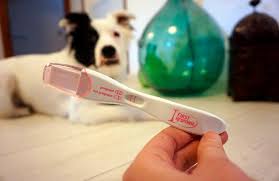How to tell if dog is pregnant. Do you suspect your bitch might be pregnant? Don’t know what to look at to find out if your pet is pregnant? Is our pet’s behavior very different when pregnant? What physical changes do you experience gradually? Discover the most complete information to know if or not your bitch will have puppies in a few months. To answer the question about How to tell if dog is pregnant, you should continue reading this interesting text
Pregnancy is the result of an important life stage for a bitch: zeal. Next, we’ll introduce you to all the information about zeal in.
Zeal in – Phases, duration and behavior
The sex and reproduction cycles of the dog are very different from the hormonal cycles that govern the sexuality and reproduction of the human species. It is important that we can understand this situation before we continue.
The bitch’s first zeal
The arrival of the first zeal is an indicator of the appearance of sexual maturity and may vary depending on the size of the dog. Generally, we can see that it occurs in the following months of life:
- Small dogs: between 6 and 12 months.
- Medium and large dogs: between 7 and 13 months.
- Giant dogs: between 16 and 24 months.
Zeal is an indicator that the bitch is sexually receptive, however, we must remember that the arrival of zeal does not mean that a bitch is prepared for gestation. When the first zeal arrives, the bitch is still in the growth stage. Therefore, if the dog gets pregnant at this stage, it can put childbirth at risk or bring consequences on the puppies.
What is the heat cycle in the bitch?

Usually, the bitch’s zeal appears twice a year, every six months. Keep in mind that this period is variable in each bitch and may be affected by the age or health of the bitch. There are who experience only one zeal a year. Whenever you have doubts or notice any abnormalities, go to your trusted veterinarian.
Phases of the cycle and major symptoms
1. Proestro
This stage can be somewhat tricky to detect, especially in that produce a little heavy bleeding. It usually lasts between 3 and 17 days and at this stage the bitch is not fertile.
We may notice an inflamed vulva that releases bloody secretion, more or less diluted. The bitch can regularly inging her vagina, as well as be anxious to leave the home. In some cases they experience riding-like sexual behaviors.
2. Estro
It is the fertile stage and is the time when the female is receptive to riding. It has a duration similar to the previous stage, approximately 3 to 17 days.
In this cycle, it’s very common for your bitch’s character to change. Your bitch will affectionate and predisposed, uneasy and wanting to leave. On the street you can get to stop to attract the local males and you will urinate on many more occasions, trying to leave as many pheromones as possible.
3. Right-handed
The duration of the right hand can vary between 60 and 100 days. This will depend directly on whether or not fertilization has existed, in which case pregnancy, childbirth and lactation will occur. At this stage the bitch rejects the ride, eats abundantly and her character stabilizes.
Due to the genital stimulation that can occur in the vagina or breasts, if the bitch has not become pregnant she can develop a psychological pregnancy, directly related to her high hormonal production.
4. I craving
In the case of pregnant, the right hand ends with childbirth, giving way to the den, the period of sexual inactivity.
It usually lasts approximately 130 days and helps the bitch have a rest stage after delivery so that her body can recover properly. After this time, the non-fertile bleeding that we mentioned at the beginning, the proestro, will occur again.
How long does a bitch’s zeal last?

The duration of a bitch’s zeal may vary depending on her size, age or health status. It usually lasts between 15 and 21 days, but in some cases can be almost non-existent as well as in others very abundant.
Panties for the bitch’s zeal
In the market you can find all kinds of products for the zeal of the bitch that will help you keep your home clean.
When is the right time to sterilize a bitch?
Sometimes the bitch’s fertile and zealous process can be annoying for both her and us. Although it is not an easy decision we should think about sterilizing our pet for an improvement of its health and behavior among others.
It is important to mention that, if we sterilize our bitch before her first zeal, we significantly reduce the onset of various cancers. In addition, it is an option in solidarity with the number of abandoned dogs that exist in the world, considerably reducing the chances of our dog getting pregnant.
Signs of Pregnancy in dogs. How to tell if dog is pregnant
What are the Symptoms of a Pregnant Bitch, How to tell if dog is pregnant.
• Bulging belly.
Around 30 days gestation, our veterinarian, through a physical examination, will be able to perform the palpation of the uterus that can confirm the state of pregnancy.
• Nipple status.
This is probably the most obvious symptom of pregnancy, as during pregnancy the bitch’s nipples increase in size and become a more intense color.
• Vaginal discharge.
Changes in the vaginal discharge of the pregnant dog are also common. We will be able to observe white or transparent vaginal discharges, never with blood, black or green.
• Behavior.
Behavior is an unreliable indicator to confirm the pregnancy of the bitch, but it is an aspect that we cannot overlook. It may appear abnormally active or, on the contrary, much more listless. It is common for him to refuse contact with other dogs, especially males, and to make his attitude towards us more affectionate or more arisca. There is also the search for the “nest”, that’s when the bitch searches for gloomy and comfortable places to take refuge and have her litter there.
• Vomiting.
Around 35 days gestation, when the uterus rotates and retreats, the bitch may experience certain bothers that include vomiting.
• Food.
Feeding is a fundamental aspect in the pregnancy of the bitch, but while most increase her appetite, some completely reject her usual diet. In the care section we will pay close attention to this very important aspect.
Pregnancy test for dogs. How to tell if dog is pregnant
How to tell if dog is pregnant, can be a very special and wonderful experience when gestation is desired and carried out in a responsible way. However, it can also be a difficult process when conception has been accidental. If you suspect that your bitch may be pregnant, here are the pregnancy test for dogs that can help you confirm this situation.
Serological tests for the diagnosis of gestation.
Experts seek to detect gestation in as soon as possible. To do this they investigate different hormones linked to this period, which allow a more effective diagnosis. The problem is that don’t have a specific hormone like women. Hence the complication to develop a test.
The experts have ruled out progesterone (hormone present in pregnant women) because this hormone is also elevated in non-pregnant. Some proteins such as fibrinogen increase during pregnancy. However, it is also related to inflammatory processes. The same goes for prolactin, also high in pseudo gestation.
There is the possibility of measuring follicle-stimulating hormone, which, at a high concentration, indicates gestation between 16 and 18 days after fertilization. The problem is that it’s a very expensive test, for that reason, it’s not used.

Relaxina test.
The peculiarity of relaxin is that it is a hormone that produces the placenta. It is therefore the closest thing to a specific gestation hormone in this species. This test can be used to confirm a pregnancy in the bitch. And it can be used between 21-30 days after fertilization. How to tell if dog is pregnant
There is a commercial test that works with serum or plasma. However, this test may result in an erroneous result. For that reason, it is recommended to apply the same test a week later. It can also test positive for some time after an abortion has occurred.
However, to confirm a pregnancy in the bitch, it is advisable to go with our trusted veterinarian, who will be able to carry out different studies and confirm if our bitch is actually pregnant or if on the contrary it is a psychological pregnancy.
In addition, it is essential that the veterinarian carry out the necessary studies to ensure that the puppies are alive or that the mother enjoys a good state of health. Here are some different pregnancy tests on the bitch that you can do at a veterinary clinic:
Palpation.
Another way to answer the question How to tell if dog is pregnant, it’s with the Palpation. This test requires some skill and is probably the most economical method. It is important to note that it is not 100% reliable and that it will not reveal any health problems in the mother or puppies. Palpitation can be performed when the bitch has 30 days gestation

Blood test.
The presence of a hormone called “relaxin” can confirm the pregnancy of the dog from 30 or 35 days gestation. This test does not reveal the number of puppies, but it can give us information about the parent’s health status.
Radiography.
X-ray tests can be done from 45 days gestation, however, it is recommended to do so during the last third of pregnancy, when the risk it carries for puppies is minimal. By means of an X-ray we will be able to know the number of puppies and possible malformations that experience them.
Ultrasound.
It is the most common and recommended test during pregnancy of the dog, as it tells us the number of puppies and also confirms that they are alive. It can be done from 25 to 35 days, but if it is not done exhaustively you can overlook one of the puppies.
Once we’ve resolved the issue How to tell if dog is pregnant, it was time to answer other important questions.
How long does a bitch’ pregnancy last?
The pregnancy of the dog lasts approximately 65 days, although it can be variable depending on the size, experience of the progenitor or other factors, so accurately predicting the time of delivery is a rather complicated task, even for the most experienced veterinarians.
In some cases may end the gestation period between 58 and 63 days, but in other cases it can be delayed up to 68 and even 70 days. There are some factors that influence gestation time, such as litter size. Usually waiting for few puppies tend to have childbirth earlier, while those waiting for a higher number of puppies tend to lengthen it.
The bitch’s pregnancy week by week
Next, we’ll detail in more depth what the stages of a dog’s pregnancy are like.
• Fertilization.
During riding, the male ejaculates up to three times. After copulation, the male’s semen moves, waiting for the female to ovulation for egg fertilization to occur.
• First week (0-7 days).
In these early days, meiosis occurs, which means that fertilized eggs begin to divide. During the first week of pregnancy we will not notice any obvious symptoms of pregnancy. As the cells are dividing and pregnancy has started in the uterus.
Second week (8-14 days).
At this stage female sex cells continue to divide, but we will not yet be able to notice any noticeable changes. Maybe there’s only a few behavioral changes.
• Third week (15-21 days).
Fertilized eggs measure between 0.8 and 1 cm, and are implanted in the bitch’s uterus. These “packages” will become puppies, even, you could already observe small figures. At this time we can go to our veterinarian to perform a blood test and ensure the good health of the parent.
• Fourth week (22-28 days).
In this week the embryos already measure between 2 and 3 centimeters, being possible to perform abdominal palpation, and some of the symptoms such as increased breast size or vaginal discharges are also observed. Puppies already have a spine.
• Fifth week (29-35 days).
Embryos already measure around 5 centimeters, and begin to develop much faster. It’s time to start paying close attention to feeding and other parent care. Therefore, we recommend going to the veterinarian for some advice and performing the first ultrasound.

• Sixth week (36-42 days).
The embryos already exceed 6 or 7 centimeters and, therefore, the female’s abdomen is increasingly large. It is time to prepare our progenitor’s nest and continue to pay attention to its care. In this week we will be able to perform a rediography to know the number of fetuses.
• Seventh week (43-49 days).
Puppies have already reached the size they will be at the time of delivery and we will notice that the breasts already have milk. It is also possible for the bitch to start decreasing the food intake. It is highly recommended to do the x-ray this week, as we will be able to more easily foresee some possible problems of childbirth.
• Eighth week (50-57 days).
At this time the conditioning of the nest becomes more important, as the female will begin to shelter there much more constantly. We must ensure a proper temperature, as well as leave food and water at your fingertips. Fetal movements are evident to the touch and milk will begin to flow naturally. As long as we don’t cause unnecessary stress on the bitch, we can perform a bath to make sure the time of delivery is as hygienic as possible. However, if we notice nervousness, we will use a dry cleaning shampoo.
• Ninth week (58-65 days).
The time of delivery approaches and the puppies are fully formed and ready to be born. It is very important to leave room for the bitch, as at this time she will start hiding in the nest and to be slightly upset.
You may experience contractions, involuntary urination, vaginal secretions, tremors, and vomiting. It is time to have at hand the phone of a 24-hour emergency veterinarian who can travel home if necessary. As some problems of childbirth can become very serious and put the life of the bitch and the little ones at risk.
Behavior of a pregnant bitch
It is essential to pay attention to the behaviors of a pregnant bitch, because we should know that stress or anxiety can cause serious effects on the development of puppies.
At this stage progressive social isolation occurs, because the bitch prefers to spend more time alone in her nest. Especially in the days leading up to delivery. Ideally, you should try to maintain your normal routine as long as possible.
The bitch may also be aggressive towards other family members (other pets or people) but this is normal. Therefore, you must not water or punish her. The best option is to try to get away from her and leave her alone.
Caring for a pregnant bitch
Pregnant need constant care and care from their guardians. In addition, they should go to the veterinarian to guide us in this process. Because each pregnancy is unique and each parent may need certain particular attentions that ensure the good health and proper development of fetuses.
Feeding a pregnant bitch
Feeding is essential for optimal health of mothers and puppies. Remember that puppies feed through the placenta. Therefore, follow the tips below:
For the first five weeks, the bitch doesn’t gain weight, significantly. Therefore, at this stage we must feed it normally, to avoid being overweight, which can affect your health and cause possible problems in childbirth.
Besides, a bitch should continue her exercise routine.
From 36 or 42 days gestation, we must increase the amount of food of the bitch. Always on the prescription of a veterinarian.
If you notice certain anomalies in the bitch’s faeces or don’t want to eat. You can offer cans of wet food or even home-cooked diets. Don’t forget that hydration is a must, so you should always have fresh, clean water.
In the final phase of pregnancy, the bitch increasingly has less space in her body to house food. It may be interesting to offer you a smaller amount of food, but increase the number of shots. But it is very common for the pregnant bitch to stop eating in the days leading up to delivery.

Currently there are square-shaped structures called “parideras” whose price can range from 50 to 300 euros. They stand out mainly for having cylinders or plates that prevent the crushing of puppies and are usually well insulated from the outside.
The shed should be placed in a secluded room, away from the movement of people or other dogs. It must also be accommodated with a mattress or cushion and some blankets. To avoid dirt we can place on top of a rubber or any other plastic surface, especially useful after birth.
The paridera must have natural light and a pleasant temperature, as well as be away from the air currents or direct rays of the sun. The bitch will start wanting to be in the shed or “nest” days before delivery.
The Birth of a Bitch
Childbirth is the most anticipated time of the bitch’s pregnancy and probably the one that generates the most doubts. If your vet has ruled out any risks and doesn’t need a C-section, your bitch can give birth at home. Otherwise, when you notice the first symptoms of childbirth in the bitch, you should go to your veterinary clinic urgently.
Childbirth is a difficult time for the bitch and you should let her manage her nervousness and anxiety herself, avoiding manipulating her or forcing her to do anything she doesn’t want. However, it’s important to stay at a reasonable distance to make sure everything’s going well. Remember to have the vet’s emergency number handy in case any complications arise.
Signs that the bitch’s birth is coming
How exactly will we know the time has come? What should we expect from the time of delivery? There are some signs that make it clear that the time of birth of the puppies is coming, for that reason, you must know them all.
The most obvious symptoms of childbirth in the bitch:
- Experienced usually start producing a lot of milk 48 or 24 hours before delivery, while first-time around 7 to 10 days prior to delivery.
- A bitch about to give birth tries to hide constantly in her relative, let’s leave her space.
- Tremors, vomiting and urine may occur.
- We will observe abdominal and uterine contractions every 5 to 15 minutes.
- The bitch will expel a mucous-blood secretion, for that reason, if your bitch is pregnant and throws mucus with blood or something like “brown flow”, do not panic, is that the delivery is coming.
- The behavior of the bitch at this time will be very altered.
- Decrease in body temperature between 1 and 2oC that we can know by taking the temperature to the bitc.
What’s a bitch’s birth like?
Especially if you’re in the face of the birth of a first-time bitch, you need some advice to find out if everything’s going well. You should know that the dog’s delivery can last up to 4 hours and that the rest time between fetus and fetus can be extended from 30 minutes to 2 hours, although it is not the most common.
One sign that something isn’t going well is that the bitch has contractions and doesn’t expel any puppies in a long time. There are three phases of childbirth in the bitch:
1. Relaxation or dilation of the uterus.
4 to 24 hours long. The female prepares to expel the cubs. It’s a time of restlessness and nervousness. The vulva enlarges and can even secrete some fluids.
2. Expulsion of the young.
When contractions begin to become intense and last at least 60 seconds we must be very relaxed because the birth is about to begin.
We’ll watch him inging the genital area. Contractions will become stronger until the first puppy is expelled from the body (still attached by the umbilical cord to the placenta). The rest of the puppies are going to follow you according to small intervals of time. Childbirth usually lasts about 2 hours, although it can be considerably lengthened if it is a very large litter.
The female will lick the cubs to stimulate them while cutting off their umbilical cord. There are very few cases where you do not, if you notice that you have no strength or do not carry out this task do it yourself. Remember to tell the puppies to know that they’re all out based on the X-ray results.
3. Placental ejection.
During childbirth, each puppy is born wrapped in a placenta, on each of these occasions the dog breaks it to let the puppy breathe and subsequently eats it, as the nutritional value is very high. If you notice that it doesn’t break the placenta, do it yourself, otherwise the puppies could die. In addition, we advise that if the placenta expelled is too large do not let your bitch eat it, it can lead to digestive problems.
Childbirth problems

We can say that in most cases there are usually no risks in childbirth, yet for this reason precisely, we have recommended you throughout the article that you go periodically to the veterinarian during pregnancy, because the professional by performing different tests will tell you if your pregnant bitch can give birth at home without any problem or will require specialized attention.
If you notice any of the problems in the delivery of the bitch shown below call the emergency veterinarian without any delay:
- No uterine contractions
- Birthless uterine contractions
- Hemorrhage
- Abortion
- Fetus jam
- Placenta retention
- Fetal death
- Mummification
Some tips for the 3 most common problems:
- Puppy Jam: If we notice a small puppy stuck in the birth canal we will never pull it, we will have to spin it clockwise to encourage the overture of the vagina.
- The bitch fails to cut the umbilical cord: We will cut it with scissors ourselves, then we will tie a knot.
- A puppy does not breathe: We will open his mouth and practice artificial breathing, in addition we will massage the chest region vigorously and bring heat without hurting him. Shake it a little while holding your head carefully
Postpartum of the bitch
If your dog has given birth to your dogs by C-section, you should pay special attention to their care, to prevent the stitches from opening and ensure that the wounds heal properly. Precisely when the bitch goes through a C-section it can happen that rejects the puppies.
Remember that puppies rely entirely on their parent, both to receive food and to regulate body temperature. Their milk is very important because it immunizes them with diseases that may exist in the environment by means of a substance called “colostrum”. If you notice that the mother doesn’t feed her cubs, you’ll have to do it yourself.
Wrap them in cotton towels and we will place them all in the same small, hot environment. If your bitch doesn’t offer to breastfeed you will bring her the milk you have purchased in the pet store, always in small doses and being very careful. Call your trusted vet and ask him for advice.
How to tell if dog is pregnant








